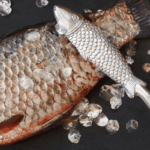How to Prevent Eggs From Sticking to Enameled Cast Iron
Pre-egg preparation and things to do while you’re actually cooking your eggs are both important parts of preventing eggs from sticking to enameled cast pan.
Let’s go over them one by one.
The well-rounded egg requires proper pan maintenance. If you treat your pan with respect and care, it will provide you with many years of service.
Here’s how to make a great skillet:
Season Your Pan
Seasoning cast iron pan does not imply sprinkling it with a variety of spices. Instead, a layer of hardened oil should be applied to your skillet.
Coat the inside of a pan with oil and heat it until the fat inside polymerizes.
Polymerized oil acts as a hard, plastic protective layer for enameled cast iron, preventing acidic food damage, reducing the likelihood of scratching, and smoothing the surface.
To season a pan, follow these steps:
- Wash your pan and ensure there are no crumbs clinging to it.
- Dry it.
- Coat your pan evenly with an oil that has a high smoke point like canola oil.
- Heat it in the oven at 450℉ upside down for 30 minutes.
- Let the oil cool to harden properly.
- Repeat steps 3-5 a few more times.
With your pan now well-seasoned containing a glossy patina, you can create magnificently cooked eggs on them.
Wash Properly
Use non-citrus dish soaps to clean your enameled pan and stay away from lye-based soaps. These ingredients eat away at the exterior gloss and enameled surface over time.
Use nylon-based scrubbers instead of metal scrubbers when washing your pan, as metal scrubbers will cause dents and nicks in the pan’s surface.
If you can’t get rid of stubborn stains any other way, soak them in a baking soda or vinegar solution.
Do Not Use Metal Utensils
If your cast iron is your only pan, it’s likely that you’ll use it to prepare a variety of foods. When cooking, never use a metal utensil because it will scratch your food.
These utensils will not only scratch off the glossy patina or seasoning, but they may also cause dents in the enamel, which are more difficult to repair. Instead, when cooking, use a wooden or plastic spatula or spoon.
Do Not Switch Between Extreme Temperatures
Enamel is a glass-based coating, and its inherent properties reflect this.
If you immediately remove a cast iron pan from a hot stove and place it in cold water, the enamel layer will crack, and you will need to have your cast iron re-enameled.
Use Enough Fat
Because of the non-stick nature of enameled cast iron, you should grease the pan with enough oil or fat before making eggs.
I’m not talking about using bacon grease to fry your eggs later. When cooking, liberally coat your pan with vegetable oil or shortening to ensure a smooth ride.
Use the Correct Temperature
Before adding your eggs, preheat the pan over medium heat. If the oil begins to bubble, your pan is too hot, and you must wait for it to cool before resuming cooking.
Once you’ve added your eggs, lower the heat.
Maintain Patience
A cast-iron pan is not the same as a stainless steel pan, and it will not produce the same results. If you move the egg mixture after only a few seconds, it will not be cooked and will stick to the pan.
Although a few seconds on non-stick or other pans may have been enough to semi-cook the eggs, a cast-iron pan will take a little longer, so be patient.
Like any other pot, an emaciated cast iron is. It comes with ups and downs, such as durability and ease of use, and downs and is not the easiest way to cook certain foods.
Emailed pans, however, are one of the most sought after pans on the market, which create lovely meat sears and are one of the best pans for cooking eggs.
While this enamel cast iron cannot be instinctive naturally, it takes a while, patience and experience to make whatever kind of food you need.
If you press on, you’re going to cook your eggs in your cast iron in no time as a professional.
Was this helpful?
Hi there! I’m a food enthusiast and journalist, and I have a real passion for food that goes beyond the kitchen. I love my dream job and I’m lucky enough to be able to share my knowledge with readers of several large media outlets. My specialty is writing engaging food-related content, and I take pride in being able to connect with my audience. I’m known for my creativity in the kitchen, and I’m confident that I can be the perfect guide for anyone looking to take their culinary journey to the next level.







![Preparing [champ chicken sausage] - raw sausages boiling in a pot and cooking in a pan.](https://milkwoodrestaurant.com/wp-content/uploads/2026/02/image-1-4-150x150.jpg)
